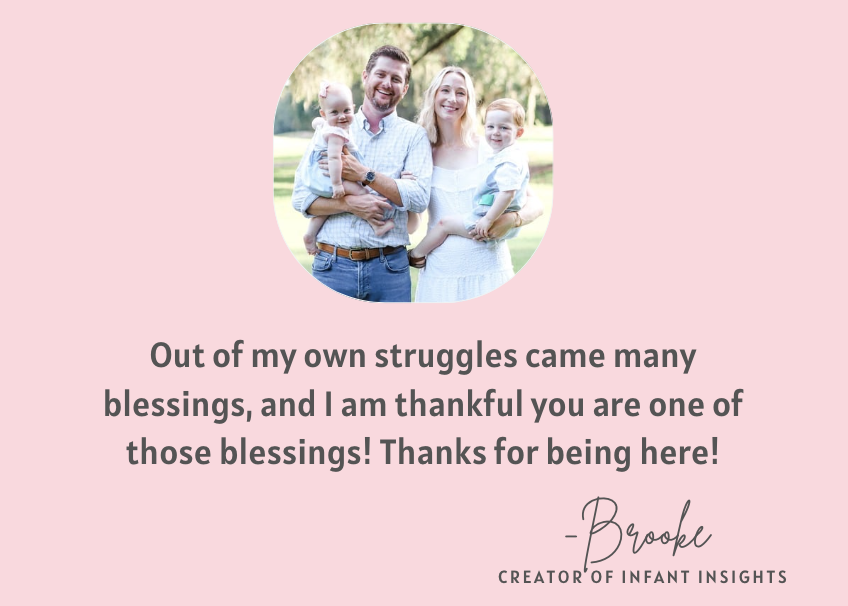Does My Baby Need to Learn Independent Sleep Skills | From the Infant Insights Sleep Consultant
This blog post was written by the sleep consultant on the Infant Insights team.
When it comes to the topic of sleeping through the night, parents often wonder if it’s the right goal for their baby or toddler. The real answer? It depends! Each family is unique, and what matters most is that your baby and your family are happy, healthy, and well-rested. If what you’re doing is working and everyone is content, keep doing it. For many, sleeping through the night is a worthy goal, but only if it aligns with your family's needs and feels right for you and your baby.
It’s undeniable that sleep is crucial—for babies, kids, and adults alike. Good sleep allows babies to grow and develop, gives parents the rest they need to be at their best, and supports the overall health of the family. But the journey to sleeping through the night isn’t always straightforward.
Here’s a look at how you can decide if it’s the right time to focus on independent sleep skills to help your baby reach that “sleeping through the night” milestone.
4 Key Signs Your Baby Might Be Ready to Learn Independent Sleep Skills
Deciding whether or not it’s time to work on sleeping through the night can be challenging, but there are a few clear signs that it might be time to consider developing independent sleep skills. These signs can help you determine if you’re ready to help your baby learn to fall asleep on their own and, hopefully, sleep through the night more consistently.
1. Baby Takes Longer to Fall Asleep Than They Did Before
A common sign that your baby may be ready to start learning how to fall asleep independently is if they suddenly take longer to fall asleep than they used to. When you’re following the appropriate wake windows for your baby’s age, but they seem to struggle to settle down with your help, it could be that they’re becoming overstimulated by your presence. For some babies, this shift occurs around 3-4 months when they experience a significant change in their sleep rhythms.
At this age, babies transition from the newborn stages of just light and deep sleep into a more mature pattern, much like adults, with four distinct sleep stages. This developmental leap is a huge one, as they’re also becoming more aware of their surroundings and growing rapidly in other ways. This combined growth can make it more challenging for them to fall asleep while being held or rocked, and it might signal they’re ready for new sleep strategies. If they can learn to fall asleep independently, they’ll be more likely to start sleeping through the night.
2. The Transfer Trick No Longer Works
For many parents, the classic “transfer” method is the holy grail of getting baby down—rocking or nursing them to sleep, then gently transferring them to their crib to finish their nap or nighttime sleep. But when this trick stops working and baby wakes as soon as they’re set down, it’s often a sign they need to learn how to soothe themselves. When a baby starts to rely less on being rocked or held, they’re also less likely to need help getting back to sleep during the night. Encouraging independent sleep skills at this stage can pave the way for longer stretches of sleep and, hopefully, sleeping through the night.
3. Frequent Night Wake-Ups
Night wake-ups are to be expected for newborns, but after the first 12 weeks or so, frequent wakings can indicate a need for more self-soothing skills. If your baby falls asleep easily at bedtime but wakes up frequently, it might be due to their reliance on being held or rocked to sleep. By helping them learn to fall asleep on their own at bedtime, you’re setting the foundation for them to self-soothe and, ideally, sleep through the night. With practice, your baby can learn the skills they need to fall back asleep on their own, leading to fewer disruptions and a better night’s sleep for everyone. Learn more about how to form routines to support independent sleep from the sleep consultant inside our affordable sleep course.
4. Short Naps and the 45-Minute Nap Intruder
Another sign that your baby may be ready for independent sleep is if they consistently wake after 30-45 minutes during naps. Often, parents find themselves trying to rescue these short naps by rocking or holding baby back to sleep, but this can become a challenge over time and can stop working. When babies learn to fall asleep on their own, they’re more likely to connect sleep cycles, resulting in longer naps and a better chance of sleeping through the night. This shift toward independent sleep helps them manage both daytime and nighttime sleep, reducing the need for assistance to fall back asleep if they wake during the night.
5. Squirmy Sleep When Being Held
If your baby seems restless or squirmy when held for sleep, it might be a sign that they’re ready to settle down on their own. This often occurs around 3-4 months, as they become more aware of their surroundings and experience a strong drive to explore their world. Encouraging independent sleep skills at this time can allow them to find a comfortable position on their own, making it more likely they’ll stay asleep longer and work toward sleeping through the night.
Making the Decision to Work on Sleeping Through the Night
Every family is different, and there’s no one-size-fits-all approach to sleeping through the night. You may feel ready to help your baby learn independent sleep skills, or you might find that holding or rocking them is what works best for your family at this time. Whatever you choose, the most important factor is that it works for you and keeps everyone happy and well-rested.
If you decide to focus on sleeping through the night, here are a few additional tips:
- Establish a Consistent Bedtime Routine: Creating a simple, consistent routine helps signal to your baby that it’s time for sleep.
- Prioritize a Relaxed Bedroom Environment: Creating a comfortable,dark, and quiet sleep space helps your baby relax and settle down, setting the stage for longer sleep stretches.
- Be Patient with the Process: The journey to sleeping through the night is unique for each baby. Changes may not happen overnight, but with consistency and patience, many babies learn to sleep through the night in their own time.
Every family’s sleep journey is different, just like every baby is different. Some families want to focus on teaching independent sleep skills, while others do not. Some babies sleep great without ever learning independent sleep skills, while others need a little boost to help achieve longer nights and naps. As long as your baby is safe and your family is content, that’s the most important. So, they choice is up to you! If you do decide you are ready to teach your baby independent sleep skills so they can sleep better at night and for naps, I would love to help you. Please reach out today through a free call for 1:1 support.








